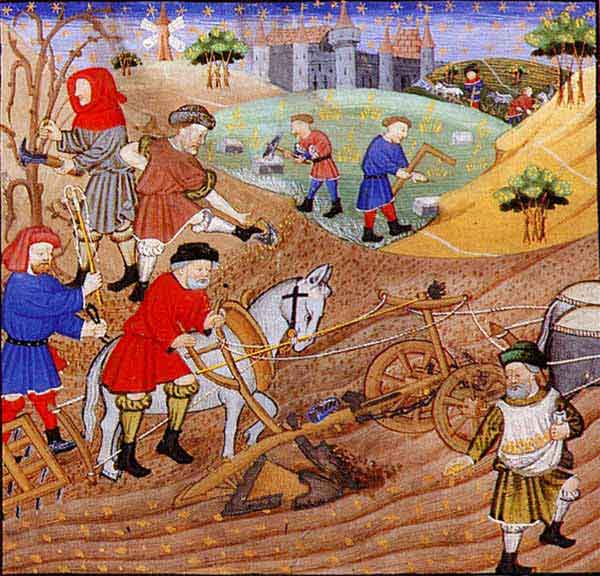Slaves
Human and gnome slavery used to be very common in human dominated realms during the
the Red Era, but now most human ruled lands limit the practice. Even most human dominated realms that permit legal ownership of slaves usually don't have large number of them.
Slaves are so low they aren’t a part of the feudal system. They are considered property. They only have the rights and privileges their masters allow, and these “rights” can be taken away at any time. Some nations have slavery and some do not. Slave status is usually hereditary passing to their children.
If the slaves are of the same race as the rulers, most slaves are criminals, prisoners of war or the descendants there of. Other times slaves are a race deemed to be inferior to the rulers.
Some human nations have
goblins slaves.
Kahdisteria has a layered hierarchy of slaves with goblins on the bottom,
humans in the middle tier and
half-humans above the others but still subordinate to their elven masters.
Serfs
The day-to-day life of a slave and a serf are pretty similar but a slave is owned by another person and a serf is legally tied to the land. Serfs cannot leave the land they work on and they are not normally paid, but they have some rights that slaves do not, at least in theory.
A feudal lord or lady cannot legally kill, rape, or beat his/her serfs without just cause. A feudal lord is legally obligated to see to the welfare of his serfs including the serfs’ post-mortem well being. In other words it is legal to reanimate a slave as a zombie, but not a serf. Serfs can usually choose whom they marry.
There are also unwritten rules and norms that feudal lords are expected to look after their serfs to the best of their ability, consideration not given to slaves (who have no rights) and peasants (who are expected to solve their own problems).
A serf can be drafted as a conscript man-at-arms of his lords army, but this is not particularly common outside of very dire situations.
Peasants
Peasants are one step above serfs. In theory, a peasant can legally leave the land they work on though most do not have the economic means to do so and survive very long.
A peasant has more legal rights than a serf. For instance if a noble kills a peasant without just cause, the noble is usually punished severely whereas the penalty for killing a serf without just cause is practically a slap on the wrist. Nobles have less leeway to inflict punishments on peasants for misbehavior. Peasants technically receive all the produce of their labor and then are subject to a tax as opposed to a serf turning over all the produce of their labor and are then the noble gives them allowance of food back to them.
A peasant can be drafted as a man-at-arms of his lord’s army. This is slightly more common than serfs being pressed to fight, but most nobles prefer to rely on their knights and other full-time soldiers over their peasants.
Besides moral reasons, a great many nobles support having free peasants over serfs because they generally have more patriotism and are more willing and able to take up arms to defend their homeland and lord.
In areas bordering the wilderness where assorted things go bump in the night, a large portion of the peasantry is usually trained as reservist soldiers.
In areas were external threats are not a major problem, the main concern is internal revolts, so peasants may be legally restricted from owning and using arms.


Comments